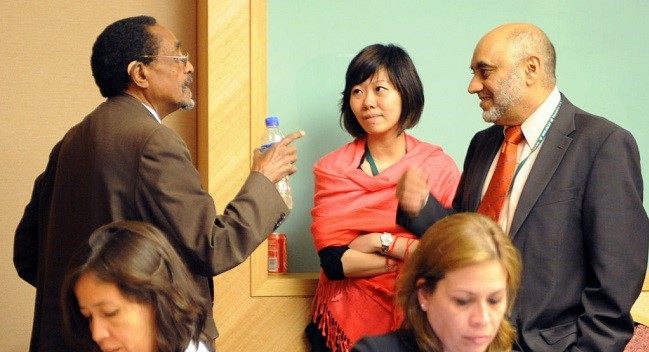In an open letter originally published in the Ethiopia Observer, former Director-General of the Environmental Protection Authority of Ethiopia and the spokesperson of the Like-Minded Group (Group of 77 & China) at the Montreal and Cartagena biosafety talks, Tewolde Berhan Gebre Egziabher, urges the government to respect the legal status of the Cartagena Protocol on Biosafety

My name is Tewolde Berhan Gebre Egziabher. I turned 80 on Wednesday, February 19, 2020.
I studied in Bangor, North Wales, United Kingdom, for my PhD in plant ecology. It is obvious that there is an overlap between plant ecology and animal ecology.
It is with this background that I served my country as the Director-General of the Environmental Protection Authority of the Federal Democratic Republic of Ethiopia, based in Addis Ababa, my country’s capital. It was because of this background that I led the Ethiopian delegation, including in the negotiations on biosafety and genetic engineering.
The outcome of the global negotiations on biosafety included the full socio-economic and environmental impact assessment of genetically modified organisms. This assessment looks at possible new and unexpected outcomes of plants and animals that could be harmful to the environment. It includes the transfer of genes modified through genetic engineering to life forms and their possible consequences. This can be avoided if it is done in a contained environment and as and when the effects have been studied and are found to be safe for all forms of life, the genetically modified organism will be allowed for use as food, feed as well as for industrialisation.
The Cartagena Protocol on Biosafety to the Convention on Biological Diversity is an international agreement which aims to ensure the safe handling, transport and use of genetically modified organisms (GMOs) resulting from modern biotechnology. This will prevent adverse effects on biological diversity, taking also into account risks to human health. To date, 172 counties around the globe, including Ethiopia, have ratified the Cartagena Protocol on Biosafety.
The Cartagena Protocol on Biosafety also requires that the cultivation of genetically modified organisms does not pollute organic agricultural crops and animals, wildlife, and other farming practices that must avoid contamination by the modified gene in the area where they are growing. It also includes the appropriateness of labelling genetically modified organisms to inform those who wish to use non-genetically modified products so that they are assured of their choice. This is a fundamental social right, the right to choose what to grow, what to eat, what to wear, and how to interact with the environment. Once a modified gene gets into the environment and the living organisms therein it cannot be taken out, eliminating the right to choose.
I led the Ethiopian delegation in the negotiations in biosafety. When the negotiations started, the African Group of Negotiators chose me to become their chief negotiator. Following that, the Developing Countries Group of Negotiators asked me to be their lead negotiator. Finally, all the negotiators except those who called themselves the Miami Group also asked me to be their chief negotiator. The Miami Group consisted of the United States of America, Canada, and Argentina, Chile, and Uruguay. The negotiations were finalised in Cartagena, which is a city in Columbia. Thus, the final agreed biosafety protocol is called the Cartagena Protocol on Biosafety.
Now, I read and heard in the news that the Government of the Federal Democratic Republic of Ethiopia is allowing the cultivation of genetically modified crops in Ethiopia. I have several worries, including the feasibility of 130,000 hectares of research being a contained environment, and how these things have been legally handled with the biosafety protocol as it stands ratified and procedures defined by the Biosafety Framework of Ethiopia defined by the Law, Policy, and Standards of the Directorate General of the Environment, Forest and Climate Change Commission, in February 2019.
If these have not been implemented, the involved parties are breaking the law, stipulated in February 2019 and laws gazetted in Proclamation No 655/2009 that was amended in 896/2015. It would also mean that Ethiopia has de-facto withdrawn from the Cartagena Protocol on Biosafety. To the extent that I know, Ethiopia has thus far kept all its laws and replaced or amended them when necessary, and it has not legally withdrawn from the Cartagena Protocol on Biosafety. As a retired old man past 80 years of age, I have no direct contact with the Federal Government of Ethiopia. Therefore, I have no way of checking whether Ethiopia is simply ignoring the legal status of the Cartagena Protocol on Biosafety or not.
If the Federal Government is simply ignoring the legal status of the Cartagena Protocol on Biosafety, then it would be obvious that it is breaking international law. This should not be allowed to happen. Therefore, I want to encourage the younger generation of Ethiopians to protest in all the ways they can. This is because breaking an international law, which includes the Cartagena Protocol on Biosafety, without legally withdrawing from it, is breaking international law and degrading rule by law in Ethiopia, in the continent of Africa and in the world at large with the exception of the members of the Miami Group, which are only five countries as opposed to the rest of the globe.
I would also urge the young generations of Africa and the rest of the world to urge their respective governments to continue respecting international law, including biosafety, globally.
